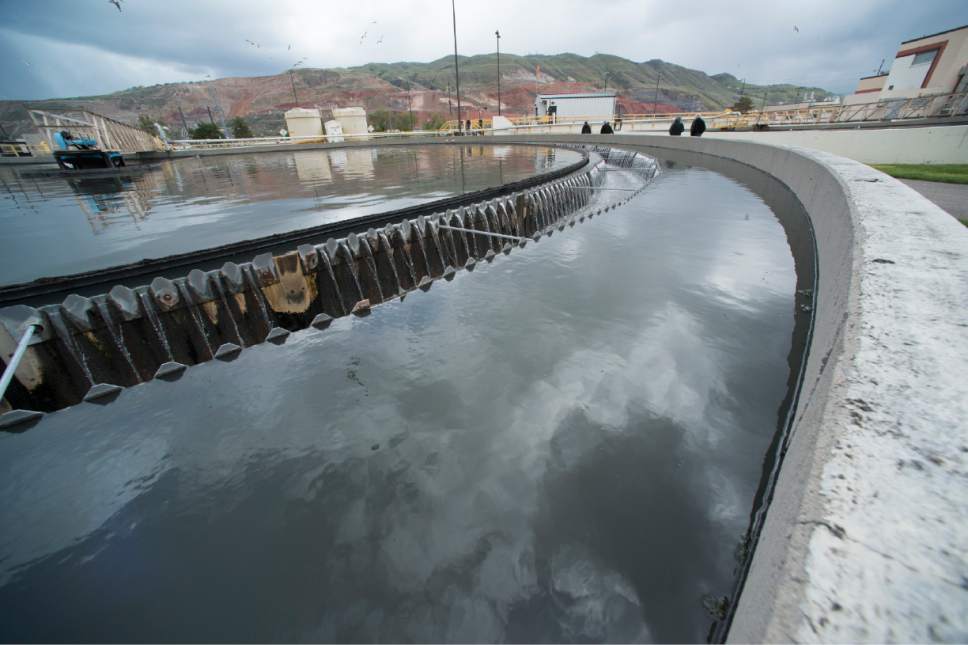This is an archived article that was published on sltrib.com in 2017, and information in the article may be outdated. It is provided only for personal research purposes and may not be reprinted.
Each year since 2011, Sandy has diverted about $1.2 million from water sales revenue into its general fund to balance the budget.
Several residents this year decided they were sick of it. If the city needs more money, they say, it should be transparent and raise property taxes. These critics have the ear of state Auditor John Dougall, whose office wrote two letters saying the practice isn't illegal but should be clearer.
The residents also highlighted an issue that irked some lawmakers and was addressed in the latest legislative session. But when a Saratoga Springs Republican sought to end the practice entirely, he found something surprising.
"I was told by the League of Cities and Towns this was the most controversial bill in 30 years," Rep. Jefferson Moss, R-Saratoga Springs, said. "I will tell you it was WWIII with the cities."
To cover their expenses, cities have found it easier to raise various fees residents pay than to hike property taxes, Moss and others said. When cities propose raising taxes, state law requires them to advertise the plan and host a public hearing that mayors and city council members dread. Hiking fees draws far less attention.
Critics of cities' increasing reliance on fee hikes, like Moss and Sen. Howard Stephenson, R-Draper, say the practice hasn't been transparent because most residents don't read or understand the thousands of lines in a city budget.
They sought to end the trend altogether with HB164 but scaled the bill back after hearing from cities that said they have their reasons for using enterprise funds — made up of user fees for such things as electricity, water and sewer — to patch holes in their general funds.
"If we were to cut the rates in our enterprise funds ... by the amount we transfer in, the average homeowner would save about $100 a year," Logan Mayor Craig Petersen said. "If we looked at the amount of increased property tax to make up for the loss of revenue ... we'd have to raise property taxes by about $245."
Petersen, a former Utah State University economics professor, said nonprofits — such as universities or religious institutions — don't pay taxes but they do use and pay for water, sewer and electricity. The base of ratepayers is a broader potential source of revenue than the property tax base, he said. Logan transferred $4.8 million last year from various enterprise funds to its general fund.
Provo routinely transfers millions of dollars from various enterprise accounts to its general fund, which it then can spend on any city expense.
In Lindon, outside Provo, city leaders told residents why the 2018 budget, which started July 1, included about $630,000 from various moneymaking services.
"Similar transfers have been made annually from the enterprise funds to the general fund in order to help maintain low property taxes in Lindon," the city wrote in a notice on its website. About 11 percent of spending by the small city's water and stormwater drainage funds goes to the general fund.
HB164 was revised so that it still allowed transfers, so long as cities posted plenty of notice and held a public hearing specifically on the transfer so it was clear to residents money raised from fees on sewer, say, could be used to pay for street repair or other city expenses.
"Now it's going to be in the hands of the residents," Moss said. "I'd rather have it come from [them] than us micromanaging."
Moss hoped that when residents were told about the transfers, they could debate the merits of that versus tax increases or belt tightening.
After a 2013 audit, which showed Kaysville had used its electric fund to buy land for economic development, residents voted to bar such transfers.
Some cities that have just completed budgeting for the new fiscal year are already hearing from residents about the issue.
In Lindon, finance director Kristen Colson said the response to this year's transfer was mild.
But in Sandy, resident Mark Randall said the shifts have allowed the city and Mayor Tom Dolan to boost spending while touting a long run of no tax hikes.
"He's not raising property taxes, he's just fee-ing us to death," said Randall, who hopes for more scrutiny of the issue. "If he said he's going to raise property taxes, he'd have to have a truth-in-taxation hearing and it would pack City Council chambers."
He and several others spoke out against the transfer at a public hearing, saying the city should raise taxes if it needs more money. He also pointed out the City Council approved a $10 million bond for water-related construction this year after transferring about $8.6 million since 2011.
Brian Kelley, Sandy's finance and information technology director, said the public was welcome to weigh in when the budget was up for debate.
"We just had been doing what other cities had done," Kelley said, which was to send about 6 percent of water money to the general fund. The city didn't analyze whether the money being transferred later was spent on services for its water fund.
Twitter: @TaylorWAnderson



